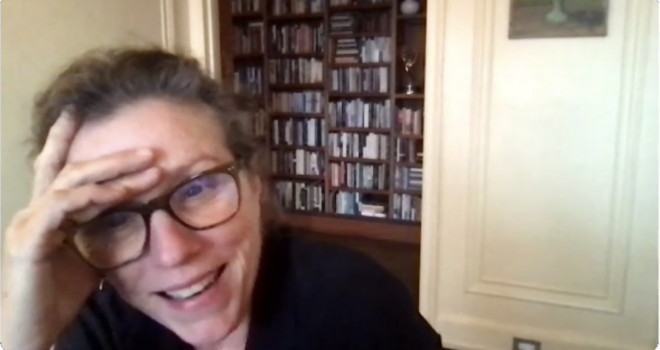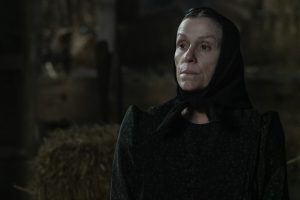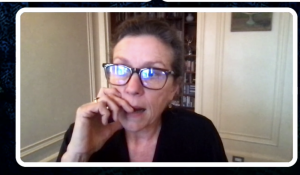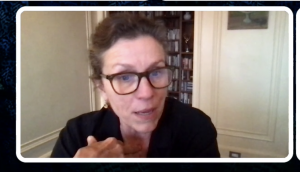By: Izumi Hasegawa December 25, 2022

Frances McDormand is one of the best actresses of our generation. She is finding the balance between being an actress, mother, wife and producer. After her Nomadland success, she used her gifts in picking this film which is about the empowerment of women.

Q: How was your encounter with the book, and what you thought about it?
I was really fortunate because I have a dear friend who works at Faber and Faber publishing in London, Walter Donohue, and we have been exchanging books for years and years because books, as you see, hold up walls where I live. They have always also offered me a passport, or sanctuary in libraries and bookstores, so my conversations with Walter have been ongoing for almost 30 years. It wasn’t about reading the novel and then seeing it as a film at all. For me, it was in 2018, before it was released here in America (it was released in Canada and Britain first). I got it a little before my time, which was exciting, it was in 2018, and our industry and our country and many other countries were starting to have a conversation around what is now called the #MeToo movement. It was inserting itself into what was hopefully going to become a movement, and I was really fascinated with the conversation and very anxious about it. 
I kind of had existential anxiety about it. I was talking about it with my friends, but when I read the book, I realized this was the kind of atmosphere, this was the kind of way that I wanted to talk about what I was feeling in a group of women, with nuance, with a sense of humor, with a sense of community, with a sense of urgency, but with a really thoughtful point of view. We all think of the Hayloft now as a very sacred place. It’s like the Hayloft is the capital H place where we all go. I think we have to start a club, the Hayloft club. [laughs] But that was when I really wanted to work with Dede Gardener (Producer of Women Talking), because of the films and her reputation and her track record, and so it wasn’t even so much thinking whether Women Talking could be a film until I sent it to her, and then sat down with her in her office. She had diagrams and she had treatments, and she had already thought of how it could go from page to screen. So that’s really when I just went along with “Oh, yeah, of course, it’s a film.”
 Q: As an actor, wife, mother, and producer, how do you find time and balance, especially because the women in this film almost have no choice in this matter?
Q: As an actor, wife, mother, and producer, how do you find time and balance, especially because the women in this film almost have no choice in this matter?
Well, I think about this a lot, working with Sarah Polley (director). It’s interesting because we represent 3 decades, I’m in my 60s, Dede’s in her 50s and Sarah is in her 40’s. And Miriam Toews (author of the novel, Women Talking) is in her 50’s. So it’s really interesting there – three decades are a time of reckoning in a way. I spent more time with Dede and Sarah during this process than with Miriam, but when I think about what they accomplish on a daily basis, it makes me want to go to bed, and I think I accomplish a lot during the day, but I’ve only had one career, one husband and one child, so I can’t really speak to it as well as I think they can. I looked up, recently, a statement by Betty Friedan (American Feminist writer and activist) when I was an early Feminist, that said “You can have it all, but not all at once.” That’s pretty much what I did, and then everyone else sees it as normal. I mean I think we all have people who supported us in this, or we wouldn’t be able to do it. That’s how you do it, you decide you’re going to do it, and then you get a bunch of partners. A million partners.
